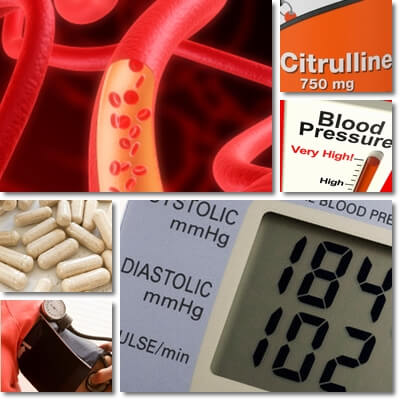Citrulline is an amino acid known for its benefits for blood pressure, muscle function, exercise performance, including bodybuilding, and benefits for the immune system and ED.
Citrulline supplements for blood pressure are aimed at vasodilating and improving blood flow to achieve a drop in blood pressure and anti-hypertensive benefits. In addition to natural food sources, citrulline is also available from dietary supplements as L-citrulline and citrulline malate.
What is citrulline?
Citrulline is an amino acid. It occurs naturally in certain foods such as cucumbers, pumpkin, zucchini, marrow, bitter melon and watermelon with yellow, orange and red flesh, as well as the white part of watermelon and watermelon rind. Citrulline is also produced by the human body from other amino acids: from arginine during the process of nitric oxide production from arginine, and from ornithine.

Citrulline is available as a dietary supplement, as l-citrulline and citrulline malate, as powder or pills. It is also available from watermelon rind extract and from watermelon juice. In fact, the name ‘citrulline’ comes from the Latin name for watermelon, Citrullus lanatus, from which it was first extracted.
Citrulline vs L-citrulline vs citrulline malate
What is the difference between citrulline, L-citrulline or l-citrulline and citrulline malate? Citrulline is the common name of the amino acid.
It can be used to refer to citrulline produced by the human body or citrulline occurring naturally in foods. L-citrulline is the name given to the amino acid in dietary supplements. It can be extracted from foods in which it occurs naturally or synthesized through the process of fermentation, for example.
Citrulline malate is a special formulation that contains citrulline or, more commonly, l-citrulline bound to malate, a salt of malic acid.
Malic acid is an organic acid occurring naturally in most fruits, fruit juices and other byproducts, including grapes, wine, cherries, mirabelles or mirabelle plums, plums, peaches, apricots, pears and especially apples.
The name ‘malic acid’ comes from the Latin name for apple, ‘malum’, and the Latin name for the botanical genus of apples, ‘Malus’. Citrulline is bound to malate to render it more bioavailable and both increase its health effects and add to the benefits.
Is citrulline good for high blood pressure?
The majority of health benefits associated with citrulline are circulatory benefits. Because citrulline is directly involved in the process of nitric oxide production, its benefits for health are primarily circulatory, with an emphasis on blood pressure regulation.
Citrulline from natural sources or dietary supplements boasts vasoprotective, vasodilating and blood pressure-lowering properties, improving blood flow, blood oxygenation and supporting blood flow to muscles, including the heart.

Benefits of citrulline for blood pressure
Citrulline for high blood pressure
How does citrulline affect blood pressure? Citrulline is good for high blood pressure because it is a precursor of arginine and arginine is a precursor of nitric oxide. Nitric oxide has vasodilating properties which means it signals to the smooth muscles of blood vessels to relax which achieves dilation. This in turn improves blood flow and lowers the pressure exerted by blood against blood vessel walls, essentially lowering blood pressure numbers.
Citrulline for blood circulation
Citrulline supplements, both L-citrulline and citrulline malate, are advertised for vascular blood flow support. But what does this mean? In simple words, citrulline supports blood circulation. And how does it do that? Citrulline is a precursor for arginine and arginine is a precursor for nitric oxide. Nitric oxide acts a vasodilating and vasoprotective agent and both improves blood flow, resulting in a drop in blood pressure, and protects blood vessels from damage caused by poor blood flow.
Citrulline for high heart rate
A high heart rate is a heart rate of over 100 beats per minute and is formally called tachycardia. Getting enough citrulline from your diet or from dietary supplements contributes to the synthesis of nitric oxide which helps decrease contractility of the heart muscle and lowers heart rate. In addition to excluding stimulants such as coffee and caffeine that are known to increase heart rate, it is important to also make sure you get all the nutrients your heart needs to function properly.
Other benefits of citrulline
The blood pressure lowering effects of citrulline make way for related benefits, including:
- Improved blood flow to muscles, with benefits for normal muscle function
- Benefits for muscle maintenance and muscle growth
- Workout booster with benefits for muscle fatigue (delaying muscle fatigue)
- Benefits for ED as a result of improved blood flow, a vasoprotective action and overall better cardiovascular health (via nitric oxide).
Find out more benefits of citrulline.
Can you take arginine and citrulline together for blood pressure?
You really don’t need to take arginine and citrulline together for high blood pressure. Citrulline initiates production of arginine which then initiates production of nitric oxide for blood pressure regulation.
Citrulline is an arginine-precursor so there’s really no reason to supplement with arginine if your body is going to make it from citrulline anyway.
Nonetheless, you will find supplements that contain citrulline together with arginine. But if you are looking for other natural supplements for high blood pressure, consider supplementing with potassium and magnesium.
Find out what is the best absorbed magnesium form and discover the difference between the different forms and types of magnesium.
